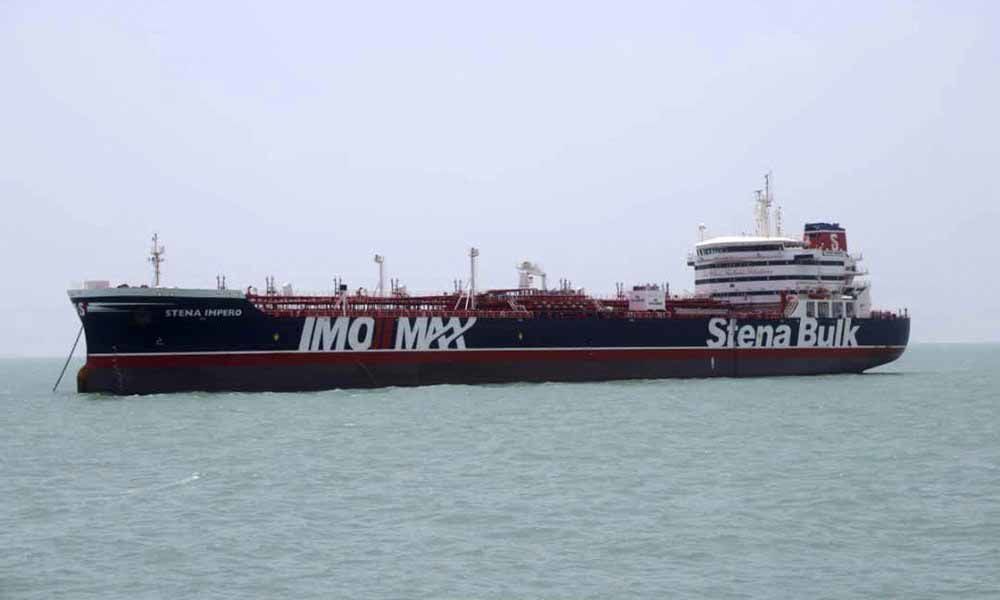Iran says its seizure of British ship a 'reciprocal' move

A powerful council in Iran said Saturday the country’s seizure of a British oil tanker in the strategic Strait of Hormuz was in response to Britain’s role in impounding an Iranian supertanker two weeks earlier.
TEHRAN, Iran: A powerful council in Iran said Saturday the country's seizure of a British oil tanker in the strategic Strait of Hormuz was in response to Britain's role in impounding an Iranian supertanker two weeks earlier.
Spokesman of Iran's Guardian Council, Abbas Ali Kadkhodaei, was quoted in the semi-official Fars news agency saying "the rule of reciprocal action is well-known in international law" and that Iran's moves to "confront the illegitimate economic war and seizure of oil tankers is an instance of this rule and is based on international rights."
The council rarely comments on state matters, but when it does it is seen as a reflection of the supreme leader Ayatollah Ali Khamenei's views. That's because the council works closely with Khamenei, who has final say on all state matters.
The free flow of traffic through the Strait of Hormuz is of international importance because one-fifth of all global crude exports passes through the waterway from Mideast exporters to countries around the world.
The British-flagged Stena Impero was seized by Iran on Friday evening with a crew of 23 crew aboard. None are British nationals. Maritime trackers show it was headed to a port in Saudi Arabia.
Two weeks earlier, Britain's Royal Marines took part in the seizure of an Iranian oil tanker carrying more than 2 million barrels of Iranian crude by Gibraltar, a British overseas territory off the southern coast of Spain. Officials there initially said the July 4 seizure happened on orders from the U.S.
Britain has said it would release the vessel if Iran could prove it was not breaching European Union sanctions on oil shipments to Syria. However, on Friday, a court in Gibraltar extended by 30 days the detention of the Panama-flagged Grace.
Iran's Foreign Minister Mohammad Javad Zarif characterized the seizure of Iran's tanker as "piracy." In comments on Twitter, he wrote that the U.K. must cease being an accessory to the "economic terrorism" of the U.S. — a reference to sweeping American sanctions on Iran.
Iran's subsequent seizure of the British tanker was seen as a significant escalation. Germany and France have both condemned the move, with Berlin saying it undermines all efforts to find a way out of the current crisis.
In London, Tom Tugendhat, the chairman of Britain's House of Commons Foreign Affairs Committee, said military action to free the British tanker would be "extremely unwise," especially because the vessel was apparently taken to a well-protected port.
Current tensions have been escalating since President Donald Trump withdrew the U.S. from Iran's 2015 nuclear deal with world powers and imposed economic sanctions on Iran, including its oil exports.
In May, the U.S. announced it was dispatching an aircraft carrier and additional troops to the Middle East, citing unspecified threats posed by Iran.
The ongoing showdown has caused jitters around the globe, with each maneuver bringing fear that any misunderstanding or misstep by either side could lead to war.
In June, Iran shot down an American drone in the same waterway, and Trump came close to retaliating but called off an airstrike at the last moment. Just this week, Washington claimed that a U.S. warship downed an Iranian drone in the strait. Iran denied that it lost an aircraft in the area. There have also been attacks on oil tankers in recent weeks that the U.S. blames on Iran — an allegation denied by the Islamic Republic.
Stena Bulk, the owner of the seized British tanker, said the vessel's crew members are of Indian, Filipino, Russian and Latvian nationalities. Iranian officials say the crew remain on the tanker.
The state-run news agency IRNA had reported earlier Saturday that Iran seized the British-flagged vessel after it collided with an Iranian fishing boat — an explanation that portrayed the seizure as a technicality rather than a tit-for-tat move.
The company that owns the ship said the vessel was in full compliance with all international regulations when it was intercepted Friday by "unidentified small crafts and a helicopter" during its transit through the Strait of Hormuz.
The comments Saturday by the Guardian Council reflect how prominently Britain has featured in the rising U.S. tensions with Iran.
There was a brief standoff between the British navy and the Iranian Revolutionary Guard vessels recently. The British navy said it warned three Guard vessels away after they tried to impede the passage of a commercial British tanker that the navy was escorting.
U.K.-flagged vessels represented less than 0.6% of the 67,533 ships sailing through the Strait of Hormuz in 2018, with 427 transits, according to maritime publication Lloyd's List, quoting research from Russel Group.
Iran's government has desperately tried to get out of the economic chokehold, urging the other partners in the nuclear deal, particularly European nations, to find ways around the U.S. sanctions.
Meanwhile, the U.S. is mulling a proposal called the Sentinel Program — a coalition of nations working with the U.S. to preserve maritime security in the Persian Gulf and keep eyes on Iran.
The U.S. is also sending several hundred troops as well as aircraft and air defense missiles to Iran's rival, Saudi Arabia, as part of its increased military presence in the region. The move has been in the works for several weeks.
King Salman approved hosting U.S. armed forces in the kingdom "to increase joint cooperation in defense and regional security and stability," a statement in the state-run Saudi Press Agency said.
Batrawy reported from Dubai, United Arab Emirates. Associated Press writer Gregory Katz in London contributed to this report.
















